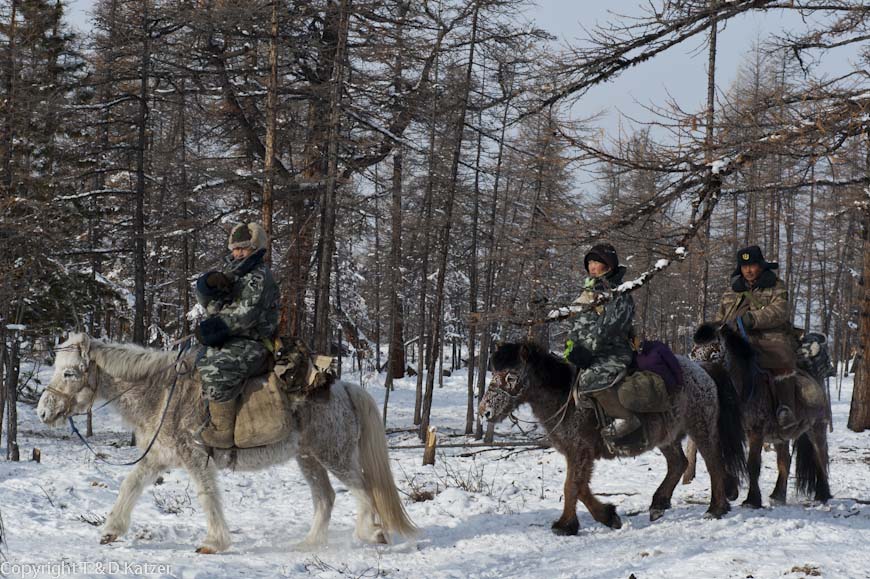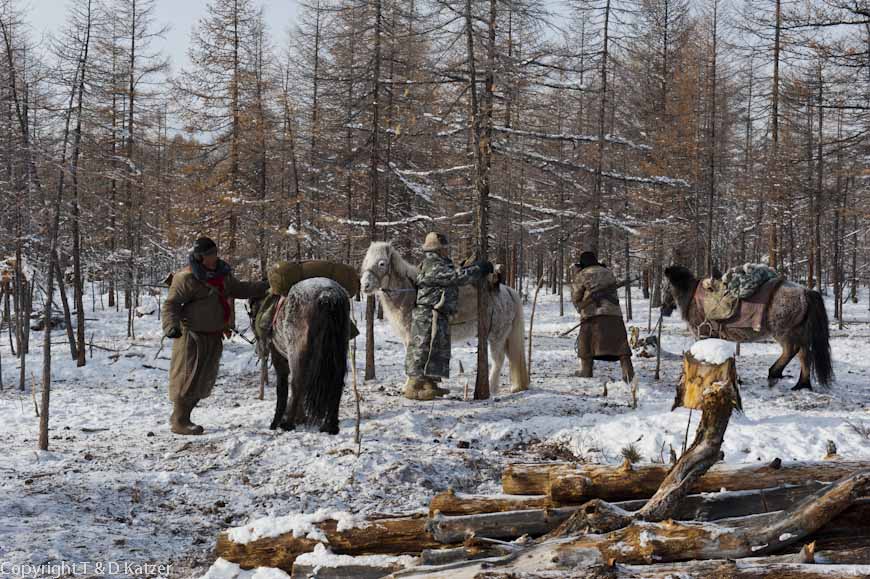
Border patrol
N 51°33'336'' E 099°15'341''
Day: 192-193
Sunrise:
09:02/09:00
Sunset:
18:10/18:12
Total kilometers:
1281
Soil condition:
Ice, snow
Temperature – Day (maximum):
minus 15°C
Temperature – day (minimum):
minus 28°C
Temperature – Night:
minus 41°C
Latitude:
51°33’336”
Longitude:
099°15’341”
Maximum height:
1981 m above sea level




The Tuwa women are eagerly waiting for their husbands, who left over two weeks ago to visit the reindeer herd 100 kilometers away from the camp. “You’re overdue,” says Tsaya sadly. “Are you worried?” I ask. “You bet. A lot can happen out there. They didn’t actually want to stay this long and only have 10 to 12 days’ worth of food with them. Today they’ve already been in the taiga for 15 days. And that at minus 43 °C. Without food, they must be freezing terribly. Their bodies urgently need food in the sub-zero temperatures,’ she says meekly, sipping her coffee. “They can hunt for something, can’t they? So they don’t have to starve,” I say. “No, they just can’t shoot anything.” “Why?” “Because they didn’t take any rifles with them. The license for a rifle is far too expensive for us. Our men can’t afford them. Besides, there are border guards patrolling the area. They would simply take the rifles from our men. That would be a disaster for the family in question. We’d barely survive the winter without a rifle.” “What? The government doesn’t allow you to own guns?” “Only if we buy the license for it.” “And what if the men suddenly find themselves facing a brown bear unarmed?” “Well, at this time of year they hibernate. But in spring, when they wake up, meeting a bear can be fatal,” we hear. “So the men already need a weapon for self-protection?” “Of course they do.” “And the government wants to make money from the gun license?” “That’s what it looks like.” “Don’t they know that you are not ordinary recreational hunters but live in the taiga with your reindeer herds and don’t have enough food to survive without hunting?” “I don’t know if anyone thinks about that?” “In other countries, it is customary for the indigenous peoples who are still alive to be allowed to hunt.” “Not in our country. That’s the reason for my concern. Oh, I hope my Ultsan comes back to me unharmed.” “Ultsan knows what he’s doing. He’s an experienced man. Besides, he’s not alone. If something unforeseen had happened, you would have known by now,” I try to comfort her. “Hm, I hope you’re right. Then I’ll go to my deserted log cabin,” we hear a voice that has lost its former self-assurance.
The dogs attack the next morning. “That’s them!” we shout, storming out of our yurt. We are surprised to see the heavily armed men riding into camp on their horses covered in ice. “Soldiers?” whispers Tanja. “Yes, this must be the border patrol we were told about. We tentatively raise our hands in greeting. One of the thickly clad men nods briefly at us. The soldiers tie their horses to the trees, dismount and walk towards Gamba’s log cabin without giving us another glance. There they take their Kalashnikovs off their shoulders, arrange them in a pyramid of rifles and step into the blockhouse. “Tough men,” Tanja says after them. “Without a doubt. Riding patrols through the taiga in these temperatures can only be for the hardy,” I agree with her.
“I wonder what they want here,” Tanja ponders. “Who knows. Do we have our permits to hand?” I ask a little nervously. “You put them in your passport,” Tanja reminds me. “Good,” I reply, because without this written permission the soldiers would immediately throw us out of the border area. Just a year ago, the patrols were allowed to charge alleged penalties of up to US$ 400 per person per day to foreigners who stayed in the area without the wipe.
As the shadows grow long, the border guards leave Gamba’s hut. They shoulder their weapons, untie their horses from the trees, mount up and ride off into the taiga without a salute. At minus 35 °C, ice crystals shimmer through the air. For a brief moment we can still hear the crunching of hooves in the frozen snow. This is when the taiga’s typical absolute silence sets in. Shivering, we return to our yurt. “That’s funny. They didn’t want to see our permit at all,” says Tanja. “I think they know who we are by now,” I reply.
We look forward to your comments!

